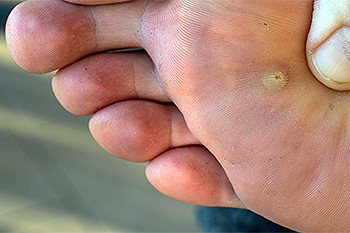
Plantar warts are non-cancerous growths that develop on the soles of the feet, caused by a viral infection from the human papillomavirus, or HPV. The virus enters the skin through small cuts or abrasions and results in the formation of hard, rough patches. There are two main types of plantar warts, solitary and mosaic. Solitary warts appear as single, raised lesions that can cause pain when walking or standing, while mosaic warts are clusters of smaller warts grouped together. Symptoms include pain, discomfort, and the appearance of a thickened, calloused area on the skin. The warts may also have tiny black dots, which are small blood vessels that have clotted. Plantar warts are contagious and can be spread through direct contact or shared surfaces, such as public pool areas. They can be painful and it may be difficult to complete daily activities. If you have developed this foot condition, it is suggested that you promptly contact a podiatrist who can offer effective treatment options.
Plantar warts can be very uncomfortable. If you need your feet checked, contact Priyanka Mude, DPM from North Canton Podiatry. Our doctor will assist you with all of your foot and ankle needs.
About Plantar Warts
Plantar warts are the result of HPV, or human papillomavirus, getting into open wounds on the feet. They are mostly found on the heels or balls of the feet.
While plantar warts are generally harmless, those experiencing excessive pain or those suffering from diabetes or a compromised immune system require immediate medical care. Plantar warts are easily diagnosed, usually through scraping off a bit of rough skin or by getting a biopsy.
Symptoms
- Lesions on the bottom of your feet, usually rough and grainy
- Hard or thick callused spots
- Wart seeds, which are small clotted blood vessels that look like little black spots
- Pain, discomfort, or tenderness of your feet when walking or standing
Treatment
- Freezing
- Electric tool removal
- Laser Treatment
- Topical Creams (prescription only)
- Over-the-counter medications
To help prevent developing plantar warts, avoid walking barefoot over abrasive surfaces that can cause cuts or wounds for HPV to get into. Avoiding direct contact with other warts, as well as not picking or rubbing existing warts, can help prevent the further spread of plantar warts. However, if you think you have developed plantar warts, speak to your podiatrist. He or she can diagnose the warts on your feet and recommend the appropriate treatment options.
If you have any questions please feel free to contact our office located in North Canton, Ohio . We offer the newest diagnostic and treatment technologies for all your foot and ankle needs.
